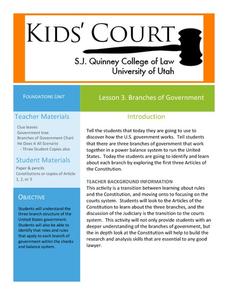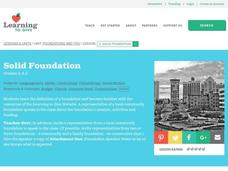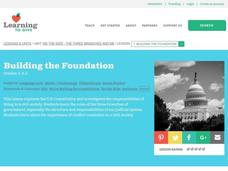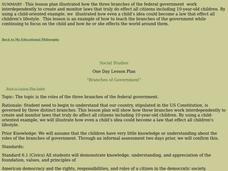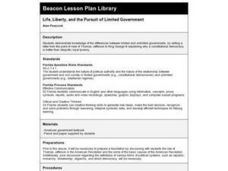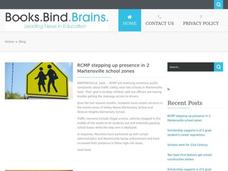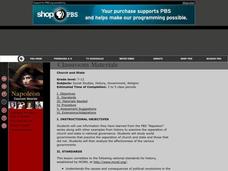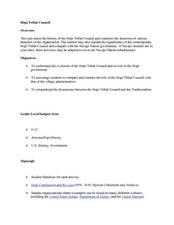Curated OER
Lesson 3: Branches of Government
Young historians climb through the three branches of the US government in the third lesson of this five-part series. While reading the first three Articles of the Constitution in small groups, children write facts on paper leaves...
iCivics
Limiting Government
While this lesson includes several nice worksheets to identify and discuss the various limits on government (i.e. a constitution, the rule of law, separation of powers, consent of the governed, etc.), its main value lies in a case study...
Curated OER
Solid Foundation
Young community members explore philanthropic foundations. They discuss the work of community foundations, and then they listen to a guest speaker describe the vision and activities of a local foundation. Is there a way they can join the...
Curated OER
Building the Foundation
Students understand the purpose of the judicial branch of government. For this judiciary lesson, students participate in exercises to understand how the court system works. Students complete activity sheets to develop understanding of...
Curated OER
Three Branches, One Goal
Helping teenagers defend their beliefs with a foundational understanding of government structure.
Curated OER
Governance- Grade 9
Ninth graders participate in talking circles about how their classroom will function. For this self-governance lesson, 9th graders participate in talking circle activities to create rules that will govern their class. Students compare...
Curated OER
Branches of Government
Students explore the three branches of government. In this government and U.S. history lesson, students listen to a story about a boy who attempts to sponsor a bill to ban cartoons. Students interview three teachers who each represent...
Curated OER
Role of the Government
Namely through discussion, get your opinionated scholars examining the roles of government- is it even necessary? They analyze the quote: "To be free, one must be chained," writing what it represents and then sharing. Consider...
iCivics
Why Government?
Why do people create governments? Where did we get our ideas about government? This is a fantastic introductory lesson for your American government class that begins by reviewing the philosophies of Thomas Hobbes and John Locke in...
Curated OER
East Asia Country Project
Get your young historians thinking about East Asian culture and history during this partner research project, in which they analyze a variety of East Asian aspects to prepare for a presentation. After an initial "what do we already know"...
Curated OER
Understanding the Debt Ceiling Debate and the Budget Control Act of 2011
Upper graders listen to a podcast on the EconTalk website featuring economist Keith Hennessey. The podcast focuses on the Budget Control Act of 2011, the national debt, and government spending. They read specifics about the BCA, then...
Curated OER
Community Foundations and Procedure
Young scholars understand what a community foundation is and how it gets input from the community. In this community foundation lesson, students form an advisory board to give suggestions. Young scholars learn procedures to hold meetings...
Curated OER
Citizenship Worksheet 2 - A Government of Laws
In this citizenship and government laws worksheet, learners identify what the United States government provides for its citizens, the foundations of that government, the principles of the Constitution, any amendments to the Constitution,...
Curated OER
Hut One, Hut Two ... Teams of the National Government: The Three Branches of Government
Eighth graders examine the three branches of government and the system of checks and balances.
Curated OER
Foundations of American Government
Fourth graders explore the origins of American government.
Curated OER
Life, Liberty, and the Pursuit of Limited Government
Students write a letter to King George III from the point of view of Thomas Jefferson. They defend constitutional democracy and explain the differences between limited and unlimited government.
Curated OER
Governance Grade 10
Students participate in talking circles regarding governance issues. In this self-governance lesson, students examine First Nations and land claims in the Great Slave Lake area in Canada.
Curated OER
Governance
Students explore government by researching Native American history. In this First Nations culture instructional activity, students define the Aboriginal action of speaking in a circle as a group. Students discuss their likes and dislikes...
Curated OER
Social Studies: Church and State
Discuss the separation of church and state as it relates to government entities. This is a great way to launch a discussion on the relationship between these groups. Learners analyze this relationship in governments throughout the world,...
Curated OER
Hopi Tribal Council
Focusing on the differences between traditional Hopi government and the Hopi Tribal Council, this resource is a good addition to your unit on Native American culture. Learners conduct Internet research, analyze primary source photos, and...
iCivics
Step Five: All about Public Policy
Public policy is important to understand because it affects everyone. The resource tells middle schoolers how the government uses policy to accomplish goals in the administration. It includes a reading, true or false worksheet, a...
Curated OER
European Union Governance
Become familiar with the structure and functions of the European Union. As they conduct internet research, young historians use an attached worksheet to categorize the five main institutions of the EU. A flowchart worksheet also gives...
Curated OER
Lesson 1: The Importance of Rules in Our Country and in Our Classroom
Explore the importance of rules in a community with the engaging first lesson of this series on the US government. To begin, children play a paper clip game that requires them to make up their own rules as they go, after which the...
Curated OER
Foundations of American Government
Students examine historical perspectives. In this Boston Massacre lesson, students watch "The Story Behind the Boston Massacre," and conduct further research on the event. Students debate the Patriot and British perspectives of the event.
